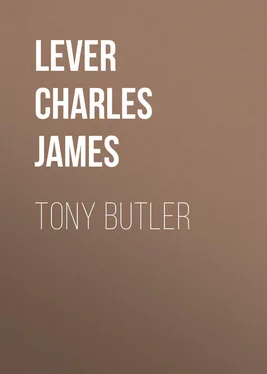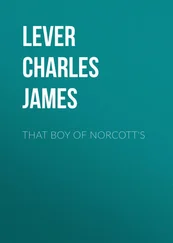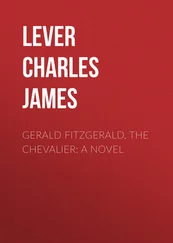Charles Lever - Tony Butler
Здесь есть возможность читать онлайн «Charles Lever - Tony Butler» — ознакомительный отрывок электронной книги совершенно бесплатно, а после прочтения отрывка купить полную версию. В некоторых случаях можно слушать аудио, скачать через торрент в формате fb2 и присутствует краткое содержание. Жанр: literature_19, foreign_antique, foreign_prose, на английском языке. Описание произведения, (предисловие) а так же отзывы посетителей доступны на портале библиотеки ЛибКат.
- Название:Tony Butler
- Автор:
- Жанр:
- Год:неизвестен
- ISBN:нет данных
- Рейтинг книги:3 / 5. Голосов: 1
-
Избранное:Добавить в избранное
- Отзывы:
-
Ваша оценка:
- 60
- 1
- 2
- 3
- 4
- 5
Tony Butler: краткое содержание, описание и аннотация
Предлагаем к чтению аннотацию, описание, краткое содержание или предисловие (зависит от того, что написал сам автор книги «Tony Butler»). Если вы не нашли необходимую информацию о книге — напишите в комментариях, мы постараемся отыскать её.
Tony Butler — читать онлайн ознакомительный отрывок
Ниже представлен текст книги, разбитый по страницам. Система сохранения места последней прочитанной страницы, позволяет с удобством читать онлайн бесплатно книгу «Tony Butler», без необходимости каждый раз заново искать на чём Вы остановились. Поставьте закладку, и сможете в любой момент перейти на страницу, на которой закончили чтение.
Интервал:
Закладка:
Caffarelli was in possession of all this; he knew what they hoped and wished and feared. The Camorra itself numbered many professed revolutionists (“Reds,” as they liked to be called) in its sect, but was itself untinctured by politics. The wily Count thought that it was a pity so good an organization should be wasted on mere extortion and robbery. There were higher crimes they might attain to, and grander interests they might subserve. Never, perhaps, was the world of Europe so much in the hands of a few powerful men. Withdraw from it, say, half a dozen, – one could name them at once, – and what a change might come over the Continent! Caffarelli was no assassin; but there are men, and he was one of them, that can trifle with great crimes, just as children play with fire; who can jest with them, laugh at them, and sport with them, till, out of mere familiarity, they forget the horror they should inspire and the penalty they enforce. He had known Orsini intimately, and liked him; nor did he talk of his memory with less affection that he had died beneath the guillotine. He would not himself engage in a crime that would dishonor his name; but he knew there were a great number of people in the world who could no more be punctilious about honor than about the linen they wore, – fellows who walked in rags and dined off garlic. Why should they stick at trifles? They had no noble escutcheons to be tarnished, no splendid names, no high lineage to be disgraced. In fact, there were crimes that became them, just as certain forms of labor suited them. They worked with their hands in each case. Amongst the Camorra he knew many such. The difficulty was to bring the power of the sect to bear upon the questions that engaged him. It would not have been difficult to make them revolutionists, – the one word “pillage” would have sufficed for that; the puzzle was how to make them royalists. Mere pay would not do. These fellows had got a taste for irregular gain. To expect to win them over by pay, or retain them by discipline, was to hope to convert a poacher by inviting him to a battue. Caffarelli had revolved the matter very long and carefully; he had talked it over scores of times with Maitland. They agreed that the Camorra had great capabilities, if one only could use them. Through the members of that league in the army they had learned that the troops, the long-vaunted reliance of the monarchy, could not be trusted. Many regiments were ready to take arms with the Reds; many more would disband and return to their homes. As for the navy, they declared there was not one ship’s company would stand by the Sovereign. The most well-affected would be neutral; none save the foreign legions would fight for the king. The question then was, to reinforce these, and at once, – a matter far more difficult than it used to be. Switzerland would no longer permit this recruitment. Austria would give none but her criminals. America, it was said, abounded in ardent adventurous spirits that would readily risk life in pursuit of fortune; but then the cause was not one which, by any ingenuity, could be made to seem that of liberty. Nothing then remained but Ireland. There there was bravery and poverty both; thousands, who had no fears and very little food, ready for any enterprise, but far readier for one which could be dignified as being the battle of the Truth and the cause of the Holy Father.
An Irish legion, some five or six thousand devout Catholics and valiant soldiers, was a project that the Minister of War at once embraced. His Excellency saw Maitland on it, and talked over the whole plan. Maitland was himself to direct all its operations. Caffarelli would correspond with him from Naples, and, in case of any complication or difficulty, shroud the Minister from attack. Ample funds would be provided. The men could be engaged as laborers upon some great public work, and forwarded in small drafts to a convenient port. Arms could be easily procured from Liège. Officers could be readily obtained, either Irish or Poles or Hungarians, who could speak English. In a word, all the details had been well discussed and considered; and Maitland, on arriving in London, had again talked over the project with wise and crafty heads, whose prudent counsels showed him how little fit he was, personally, to negotiate directly with the Irish peasant, and how imperative above all things it was to depute this part of his task to some clever native, capable of employing the subordinates he needed. “Hide yourself,” said they, “in some out-of-the-way spot in Wales or Scotland; even the far North of Ireland will do; remain anywhere near enough to have frequent communication with your agent, but neither be seen nor known in the plot yourself. Your English talk and your English accent would destroy more confidence than your English gold would buy.”
Such an agent was soon found, – a man admirably adapted in many respects for the station. He had been an adventurer all his life; served with the French in Austria, and the Austrians in the Banat; held an independent command of Turks during the Crimean War; besides, episodically, having “done a little,” as he called it, on the Indian frontier with the Yankees; and served on the staff of Rosas, at La Plata; all his great and varied experiences tending to one solitary conviction, that no real success was ever to be attained in anything except by means of Irishmen; nor could order, peace, and loyalty be ever established anywhere without their assistance. If he was one of the bravest men living, he was one of the most pushing and impertinent. He would have maintained a point of law against the Lord Chancellor, and contested tactics with a Marshal of France. He thought himself the ornament of any society he entered, and his vanity, in matters of intellect, was only surpassed by his personal conceit. And now one word as to his appearance. With the aid of cleverly constructed boots he stood five feet four, but was squarely, stoutly built, broad in the chest, and very bow-legged; his head was large, and seemed larger from a mass of fiery red hair, of which he was immensely vain as the true Celtic color; he wore great whiskers, a moustache, and chin-tuft; but the flaming hue of these seemed actually tamed and toned down beside his eyes, which resembled two flaring carbuncles. They were the most excitable, quarrelsome, restless pair of orbs that ever beamed in a human head. They twinkled and sparkled with an incessant mischief, and they darted such insolent glances right and left as seemed to say, “Is there any one present who will presume to contradict me?”
His boundless self-conceit would have been droll if it had not been so offensive. His theory was this: all men detested him; all women adored him. Europe had done little better than intrigue for the last quarter of a century what country could secure his services. As for the insolent things he had said to kings and emperors, and the soft speeches that empresses and queens had made to himself, they would fill a volume. Believe him, and he had been on terms of more than intimacy in every royal palace of the Continent. Show the slightest semblance of doubt in him, and the chances were that he ‘d have had you “out” in the morning.
Amongst his self-delusions, it was one to believe that his voice and accent were peculiarly insinuating. There was, it is true, a certain slippery insincerity about them, but the vulgarity was the chief characteristic; and his brogue was that of Leinster, which, even to Irish ears, is insufferable.
Such was, in brief, the gentleman who called himself Major M’Caskey, Knight-Commander of various Orders, and C.S. in the Pope’s household, – which, interpreted, means Cameriere Secreto, – a something which corresponds to gentleman-in-waiting. Maitland and he had never met. They had corresponded freely, and the letters of the Major had by no means made a favorable impression upon Maitland, who had more than once forwarded extracts from them to the committees in London, pettishly asking, “if something better could not be found than the writer of this rubbish.” And yet, for the work before him, “the writer of this rubbish” was a most competent hand. He knew his countrymen well, – knew how to approach them by those mingled appeals to their love of adventure and love of gain; their passion for fighting, for carelessness, for disorder; and, above all, that wide uncertainty as to what is to come, which is, to an Irishman’s nature, the most irresistible of all seductions. The Major had established committees – in other words, recruiting-depots – in several county towns; had named a considerable number of petty officers; and was only waiting Maitland’s orders whether or not he should propose the expedition to adventurous but out-at-elbows young fellows of a superior station, – the class from which officers might be taken. We have now said enough of him and the project that engaged him to admit of our presenting him to our readers in one of his brief epistles. It was dated, —
Читать дальшеИнтервал:
Закладка:
Похожие книги на «Tony Butler»
Представляем Вашему вниманию похожие книги на «Tony Butler» списком для выбора. Мы отобрали схожую по названию и смыслу литературу в надежде предоставить читателям больше вариантов отыскать новые, интересные, ещё непрочитанные произведения.
Обсуждение, отзывы о книге «Tony Butler» и просто собственные мнения читателей. Оставьте ваши комментарии, напишите, что Вы думаете о произведении, его смысле или главных героях. Укажите что конкретно понравилось, а что нет, и почему Вы так считаете.












